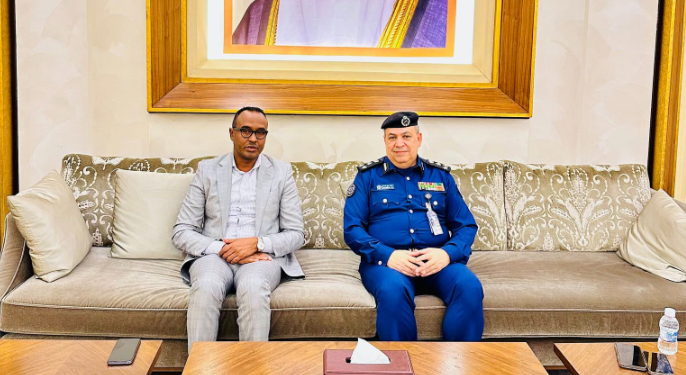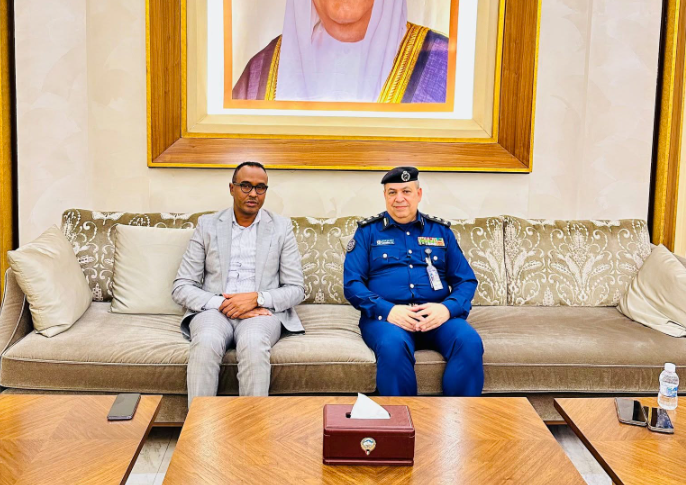KUWAIT CITY – A high-level delegation from Somalia, led by Commissioner Mohamud Moalim, head of the Somali Catastrophe Administration Company, was warmly obtained in Kuwait on Friday by Brigadier Common Mohammed Al-Qahtani, Vice President of the Kuwait Hearth and Catastrophe Administration Company. The go to marked a big step towards deepening bilateral ties between the 2 nations, with a concentrate on enhancing collaboration in catastrophe administration and humanitarian help.
The discussions, held in Kuwait Metropolis, centered on the pressing want for a coordinated worldwide response to handle the worsening humanitarian disaster in Somalia. The nation has been grappling with extreme challenges, together with extended droughts, recurrent floods, and ongoing battle, which have displaced tens of millions and left massive segments of the inhabitants in dire want of support. Compounding these points, a number of worldwide support companies have just lately suspended their operations in Somalia attributable to escalating safety dangers, additional straining the nation’s potential to ship important providers.
Commissioner Moalim highlighted the significance of worldwide partnerships in constructing Somalia’s resilience to disasters. “We face unprecedented humanitarian challenges, and the suspension of operations by some companies has created important gaps,” Moalim mentioned. “Strengthening our cooperation with Kuwait, which has a confirmed observe file in catastrophe administration, is essential for us to raised serve our folks.”
Throughout the talks, either side explored sensible methods to handle the rapid and long-term wants of the Somali inhabitants. These included the event of joint catastrophe preparedness applications, capacity-building initiatives for Somali catastrophe response groups, and the availability of technical and logistical help from Kuwait. The delegation additionally mentioned methods to make sure the security of humanitarian staff working in high-risk areas, a essential concern given the unstable safety scenario in Somalia.
Brigadier Common Al-Qahtani expressed Kuwait’s unwavering dedication to supporting Somalia throughout this essential interval. “Kuwait stands prepared to help our Somali brothers and sisters of their time of want,” he mentioned. “We imagine that by working collectively, we are able to create sustainable options that not solely deal with the present disaster but additionally strengthen Somalia’s potential to reply to future challenges.”
The assembly additionally touched on the broader regional implications of Somalia’s humanitarian disaster, with each events acknowledging the potential for instability to spill over into neighboring nations if left unaddressed. They emphasised the significance of a unified regional method to catastrophe administration and humanitarian support, calling for higher collaboration amongst Gulf Cooperation Council (GCC) nations and East African states.
This go to comes at a time when Somalia is dealing with one of many worst humanitarian crises in its historical past. In accordance with United Nations estimates, practically half of Somalia’s inhabitants—roughly 8.3 million folks—requires pressing humanitarian help. The nation can also be coping with the consequences of local weather change, which have exacerbated meals insecurity and water shortage, additional complicating reduction efforts.
Kuwait has been a longstanding associate in Somalia’s improvement, offering monetary support, medical provides, and technical experience through the years. Friday’s assembly builds on this historical past of cooperation and alerts a renewed dedication to addressing Somalia’s most urgent challenges.
Because the delegation concluded its go to, either side expressed optimism in regards to the potential for future collaboration. They agreed to ascertain a joint job drive to implement the methods mentioned in the course of the talks, with a concentrate on delivering tangible ends in the approaching months. The go to underscores Kuwait’s function as a key ally in Somalia’s efforts to attain stability and resilience within the face of mounting humanitarian and environmental challenges.










